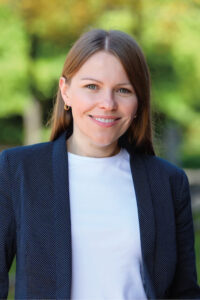Fulbright for Syta
Trinity College Associate Professor of Computer Science Ewa Syta received a prestigious Fulbright U.S. Scholar award for 2024–25 to conduct research in her native country of Poland.
The Fulbright Program—led by the U.S. government in partnership with more than 160 countries—offers international educational and cultural exchange programs for accomplished students,  scholars, artists, teachers, and professionals of all backgrounds to study, teach, or pursue important research and professional projects.
scholars, artists, teachers, and professionals of all backgrounds to study, teach, or pursue important research and professional projects.
In collaboration with researchers at Poland’s National Research Institute (NASK) under the supervision of the Ministry of Digital Affairs, Syta plans to develop a long-term strategy for the implementation of a digital identity wallet for Poland. “This is a critical component of the EU’s initiative to create a universal digital identity ecosystem, where electronic transactions can have the same legal validity as traditional paper-based transactions,” Syta said.
In 2014, the European Union introduced the Electronic Identification, Authentication and Trust Services (eIDAS) regulation, aiming for secure and seamless electronic interactions between businesses, individuals, and public authorities. “Digital identities are one of the major challenges of the digital age; when transacting online, trust matters, but it is hard to establish,” Syta said. The new eIDAS 2.0 regulation is a sweeping overhaul of eIDAS, promising to create a universal digital identity ecosystem for the EU.
The EUDI wallet, under the control of its user, would “hold” the identity and entitlements composed of verified information from different sources, Syta said. “With an EUDI wallet, a user could securely prove their age without revealing any other information included in their ID, such as their precise date of birth, photo, address, etc.,” she said. While the concept of an EUDI wallet has clear benefits, Syta said it also has privacy implications, so the legislation’s security, privacy, and compliance requirements put the control of personal information in the hands of the individual.
The development of this tool could have a tangible impact on society. “It’s powerful to take research work and apply it in practice. As a professor, I often write and publish papers, but this gives me the added ability to bring the results to the public,” she said. “The long-term objective of my research is to bring cutting-edge cryptographic techniques to real-world applications to shape tomorrow’s digital world.”
